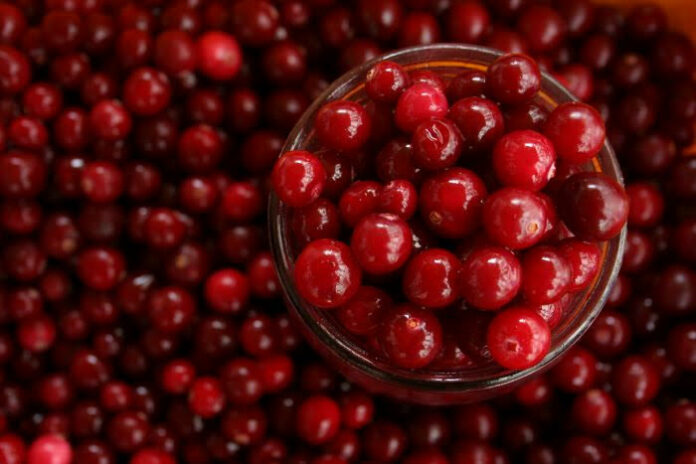Adding cranberries to your diet could help improve memory and brain function, and lower “bad” cholesterol, say researchers, who hope their findings have implications for the prevention of neurodegenerative diseases like dementia.
The team studied the benefits of consuming the equivalent of a daily cup of cranberries among 50 to 80-year-olds, and found this significantly improved the participants' memory of everyday events (visual episodic memory), neural functioning and delivery of blood to the brain (brain perfusion).
Lead researcher Dr David Vauzour, from University of East Anglia’s Norwich Medical School, said: “Dementia is expected to affect around 152m people by 2050. There is no known cure, so it is crucial we seek modifiable lifestyle interventions, such as diet, that could help lessen disease risk and burden.
“Past studies have shown that higher dietary flavonoid intake is associated with slower rates of cognitive decline and dementia. And foods rich in anthocyanins and proanthocyanidins, which give berries their red, blue, or purple colour, have been found to improve cognition.
“Cranberries are rich in these micronutrients and have been recognised for their antioxidant and anti-inflammatory properties. We wanted to find out more about how they could help reduce age-related neurodegeneration.”
The research team investigated the impact of eating cranberries for 12 weeks on brain function and cholesterol among 60 cognitively healthy participants.
Half of the participants consumed freeze-dried cranberry powder, equivalent to a cup or 100g of fresh cranberries, daily. The other half consumed a placebo.
The study is one of the first to examine cranberries and their long-term impact on cognition and brain health in humans.
Vauzour said: "Those who consumed the cranberry powder showed significantly improved episodic memory performance in combination with improved circulation of essential nutrients, such as oxygen and glucose, to important parts of the brain that support cognition – specifically memory consolidation and retrieval.
“The cranberry group also exhibited a significant decrease in LDL or ‘bad’ cholesterol levels, known to contribute to atherosclerosis – the thickening or hardening of the arteries caused by a build-up of plaque in the inner lining of an artery. This supports the idea that cranberries can improve vascular health and may in part contribute to the improvement in brain perfusion and cognition.
“Demonstrating in humans that cranberry supplementation can improve cognitive performance and identifying some of the mechanisms responsible is an important step for this research field. The findings are very encouraging, especially considering that a relatively short 12-week cranberry intervention was able to produce significant improvements in memory and neural function,” he added.
The study was supported by a grant from The Cranberry Institute. It was led by the University of East Anglia in collaboration with researchers at the Leiden University Medical Centre (Netherlands), the University of Parma (Italy) and the Quadram Institute (UK).
Study details
Chronic Consumption of Cranberries (Vaccinium macrocarpon) for 12 Weeks Improves Episodic Memory and Regional Brain Perfusion in Healthy Older Adults: A Randomised, Placebo-Controlled, Parallel-Groups Feasibility Study.
Emma Flanagan, Donnie Cameron, Rashed Sobhan, Chloe Wong, Matthew G. Pontifex, Nicole Tosi, Pedro Mena, Daniele Del Rio, Saber Sami, Arjan Narbad, Michael Müller, Michael Hornberger, David Vauzour.
Published in Frontiers in Nutrition on 19 May 2022.
Background
Ageing is highly associated with cognitive decline and modifiable risk factors such as diet are believed to protect against this process. Specific dietary components and in particular, (poly)phenol-rich fruits such as berries have been increasingly recognised for their protection against age-related neurodegeneration. However, the impact of cranberries on cognitive function and neural functioning in older adults remains unclear.
Design
A 12-week parallel randomised placebo-controlled trial of freeze-dried cranberry powder was conducted in 60 older adults aged between 50 and 80 years. Cognitive assessment, including memory and executive function, neuroimaging and blood sample collection were conducted before and after the intervention to assess the impact of daily cranberry consumption on cognition, brain function and biomarkers of neuronal signalling.
Results
Cranberry supplementation for 12 weeks was associated with improvements in visual episodic memory in aged participants when compared to placebo. Mechanisms of action may include increased regional perfusion in the right entorhinal cortex, the accumbens area and the caudate in the cranberry group. Significant decrease in low-density lipoprotein (LDL) cholesterol during the course of the intervention was also observed. No significant differences were, however, detected for BDNF levels between groups.
Conclusions
The results of this study indicate that daily cranberry supplementation (equivalent to 1 small cup of cranberries) over a 12-week period improves episodic memory performance and neural functioning, providing a basis for future investigations to determine efficacy in the context of neurological disease.
See more from MedicalBrief archives:
Flavonoids may have protective benefits against Alzheimer’s and related dementias
High-flavanol diet associated with lower blood pressure
Plant-based diet lessens risk of cognitive impairment — 12-year European study

